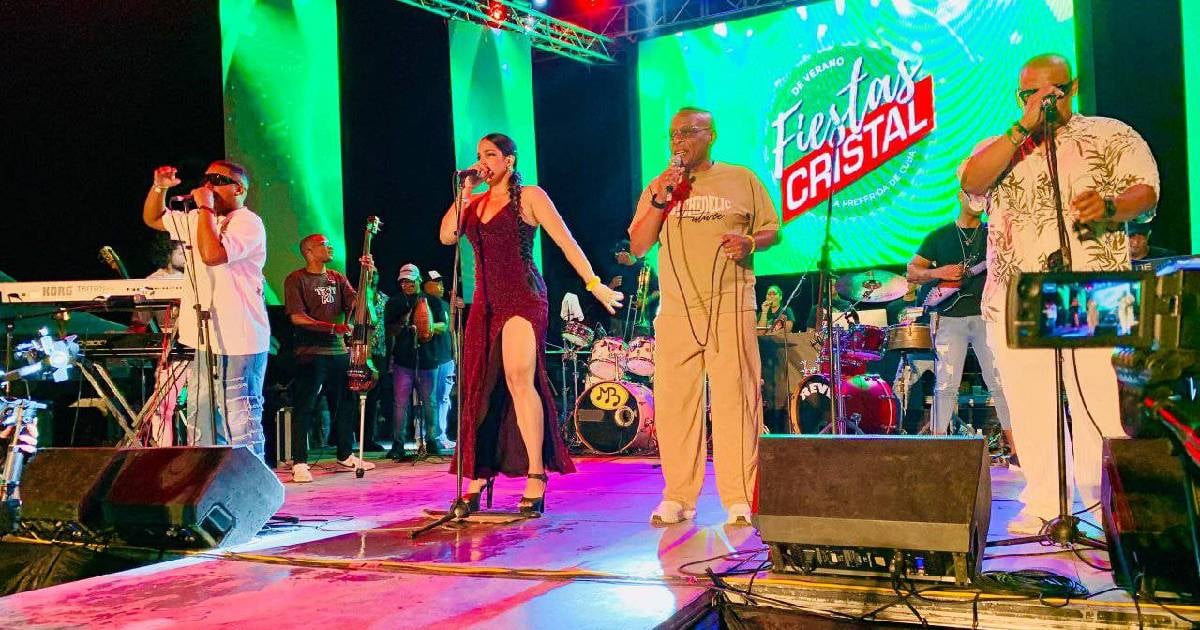While Holguín struggles with power outages and a deepening crisis, the local government hosted the so-called Crystal Party, a boisterous festivity featuring beer and concerts that provoked widespread outrage due to its extravagance and disconnection from the harsh realities faced by the Cuban people.
The event, which marked its third edition, was organized by Cervecería Bucanero S.A. and MB Producciones. It took place on Saturday, July 12, near the Major General Calixto García Stadium in what is known as the "City of Parks." The event was artistically directed by actress and television host Edith Massola, featuring live music and an abundance of beer, all while consuming significant electricity.
Performers included musical groups such as Maykel Blanco and his Salsa Mayor, Elito Revé and his Charangón, Juan Guillermo Almeida (JG), and Wildey, with Radio Taíno highlighting the event's "free admission for everyone."
This type of celebration, which has previously taken place in Santiago de Cuba and is scheduled to arrive in Havana next, is part of the official summer campaign "Always Young." It included 16 tents serving Cristal beer, raffles, games, and concerts that lasted until 2 a.m., as reported on official outlets like the newspaper ¡Ahora! and Radio Angulo's Facebook pages.
Even cultural centers like the Benny Moré Hall and the Charles Chaplin Café, both operated by Artex in Holguín, closed their doors to join the spectacle, promising "art and good company." Yet, the local population was not in the mood to celebrate. Many social media users called the event a "national disgrace."
Journalist Annarella Grimal pointed out on Facebook that the celebration coincided with the fourth anniversary of the July 11 and 12 protests in Cuba, known as 11J, when thousands spontaneously took to the streets nationwide demanding an end to the dictatorship.
The protests erupted during a period of economic and health crises, which led to severe government repression, resulting in at least one death and the imprisonment of over 1,000 Cubans, including women, the elderly, and minors, Grimal contextualized.
The Cuban government dismissed the legitimacy of the 11J protests, claiming they were orchestrated from the United States. However, it was an unprecedented display of citizen bravery that ended in violence following President Miguel Díaz-Canel's declaration on national television, stating, "The order to fight has been given."
Grimal also noted that the Crystal Party coincided with the 31st anniversary of the "13 de Marzo" tugboat massacre, where over 40 people, including women and children, died when the boat they were on, attempting to flee to the United States, was sunk on orders from the Ministry of the Interior.
This somber and symbolic date starkly contrasted with the official euphoria projected from the party's stages. Despite the event's advertised free entry, reports surfaced of VIP areas with unlimited beer, exclusive wristbands, and restricted access for leaders and those close to power.
"Free for those on stage," commented one Facebook user, while another sarcastically asked, "Will they give away the beer too?" This hypocrisy drew further criticism, particularly towards Edith Massola, the event director, who was criticized for spreading joy "from afar" while her family resides abroad.
Sarcastic remarks also surfaced regarding the absence of figures like Sandro Castro, Fidel Castro's grandson, with comments like, "Is Sandrito not coming?" referencing his promotional videos for Cristal beer.
The excessive use of electricity to power lights, sound, and refrigerated tents raised questions. "Why not save that power and give us a little more to sleep?" wrote one netizen, reflecting the frustration over the systematic blackouts suffocating the majority.
Meanwhile, residents of Holguín's El Llano neighborhood reported entire days without electricity. A young man also highlighted the increasing insecurity in the country: "Yes, it's all very nice, but the thugs wait for the party to end to start mugging people."
Grimal noted that many agreed these parties do not represent the people but rather a privileged elite "mocking the average Cuban." Amidst hunger, heat, repression, and despair, this so-called "people's party" left a bitter taste. Cubans struggle to understand how so many resources are allocated to festivities while food is scarce, hospitals are deteriorating, and the energy collapse hits the most vulnerable.
Instead of using the little resources left to alleviate the crisis, the government prefers to stage shows. It does so enthusiastically, even though the applause is dwindling. For many, it was nothing more than a smokescreen, a waste that once again highlights the disconnect between those in power and those suffering.
This is not the first time citizens have questioned such events. In February, a lavish dinner as part of the Habano Festival at the Capitol in Havana served as a clear example of this detachment. While the country faces massive blackouts and basic shortages, the elite gathered at the National Assembly's headquarters to celebrate Cuban tobacco's exclusivity, far removed from the everyday struggles of ordinary citizens.
The first lady, Lis Cuesta, has publicly defended these luxury events, arguing that "they are part of the national identity and cannot be canceled."
Cuban Crisis and Festivities
What was the Crystal Party in Holguín?
The Crystal Party in Holguín was a government-organized event featuring beer, concerts, and festivities, which sparked public outrage due to its extravagance amidst ongoing power outages and economic crisis in Cuba.
Why did the Crystal Party cause outrage?
The Crystal Party caused outrage because it demonstrated a disconnect between the government and the people's struggles, as it used significant resources for entertainment while the population faced shortages and power outages.
Who organized the Crystal Party?
The Crystal Party was organized by Cervecería Bucanero S.A. and MB Producciones, with artistic direction by actress and TV host Edith Massola.
What events coincided with the Crystal Party?
The Crystal Party coincided with the fourth anniversary of the 11J protests and the 31st anniversary of the "13 de Marzo" tugboat massacre, both significant events in Cuban history.
